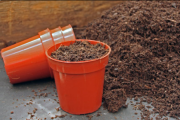The Responsible Sourcing Scheme for scoring growing media
As we move to a peat-free future, the Responsible Sourcing Scheme aims to provide customers and businesses with the guidelines needed to make informed decisions on responsible products.
The Responsible Sourcing Scheme (RSSGM) is an industry-led scheme that encourages consumers to make informed decisions about the environmental responsibility of the growing media products that they are purchasing and using.
Consumers are provided with an easy-to-understand traffic light system, empowering them to easily compare the environmental rating and therefore the impact that the mix of materials has on the environment. This enables the consumer of growing media products to make decisive choices.
The consumer can, at a glance, conclude with confidence that a product with a green ‘A’ rating is more responsibly produced than a yellow ‘C’ rated product.
Why do we need to measure environmental responsibility?
The horticultural industry needed to develop and innovate in the wake of the Government's planned proposal for the banning of peat for use in the amateur gardening sector by 2024.
As peat was to be phased out of growing media products, alternative substrates were to be used and it was vitally important to assess the environmental responsibility of these peat replacements.
It would not be as simple as to conclude that alternatives to peat such as coir or bark were responsible just because they weren’t peat, but to assess each growing media substrate equally against a stringent set of criteria. With over 10 years of development and working in cooperation with key industry stakeholders and DEFRA the Responsible Sourcing Scheme was launched in 2022.
Manufacturers provide evidence to an independent auditor
Manufacturers provide evidence to an independent auditor for each of the 7 criteria listed and upon review of the evidence, they will be presented with a score for each of the criteria.
The evidence for each criteria varies, with a score between 0 and 20 being given depending upon the evidence, and the environmental responsibility of the production process. The 7 individual scores are then combined, to give an overall total score. The total score is the score that will be seen on the product packaging.
The criteria that products must follow and be assessed on are:
- Energy Use – This assesses the energy used to create the raw material. Renewable energy such as solar power will generate a better rating than a non-renewable energy, such as coal.
- Water Use – This refers to how much water is used in the process of creating the raw material. Water is a finite resource, so we need to use it carefully.
- Social Compliance – This is all about people – making sure that people employed to provide the raw material are working in acceptable conditions, that their health and safety is considered, and no child labour or bonded workers are used.
- Habitat & Biodiversity – We want to make sure that the area where the raw material is produced minimises the impact to wildlife and creation of biodiverse habitats.
- Pollution – It is important to minimise the amount of pollution to the environment through the manufacturing process.
- Resource Use Efficiency – This assesses the amount of waste generated and what efforts are taken to minimise waste. If the raw material can be used as a by-product from other industries, then this will gain a better rating.
- Renewability – This assesses the amount of time it takes to replace the resource used.
All 7 criteria will be scored and evidenced to the independent auditor in a similar process, and although the exact scoring method may differ for each of the 7 criteria, the principle is the same.
Once the auditor has successfully worked with the manufacturer to allocate scores for each of the criteria, the scores will then be totalled. The total score correlates to a letter on the responsibility index, and it is this that is displayed on the final product for customers to view. If a product is made of multiple substrates, a weighted average based on the percentage of each substrate is used to calculate the correct score.
What is the Responsible Sourcing Scheme Aiming to Achieve?
Ultimately, the RSSGM wants to allow consumers to make the most responsible decisions possible when choosing their growing media. It is not designed to demonise peat or any other substrate but merely compare them so that consumer can make an informed decision. Through its process though, it also allows retails and growers to consider which substrates they use to blend efficacy and material responsibility into what they sell.
Who can join the Responsible Sourcing Scheme?
Any Manufacturer, Grower, or Retailer who either produces, uses, or sells growing media products can join the scheme. Retailers and Growers are assessed against the volume of growing media they either use or sell, with compliance being granted once they reach 90% or more of products used or sold from members of the Responsible Sourcing Scheme. Manufacturers are assessed and scored on the processes involved in the substrates that they manufacture.
The importance of switching to responsible methods of production is something that the Responsible Sourcing Scheme is passionate about voicing. With our environment needing protected long-term, and discussions increasing around climate change, there is no better time to switch your practices to become more responsible and eco-friendly.
For more information about the Responsible Sourcing Scheme or for advice on responsible sourcing, visit https://www.responsiblesourcing.org.uk/ or call 01507 602427
Article written by Andy Smith, RSSGM Scheme Administrator and Steve Harper, CEO of Southern Trident. Southern Trident are a carbon neutral company manufacturing coir-based growing media. Visit southerntrident.co.uk for more information on their coir-based products and their journey towards sustainability.

